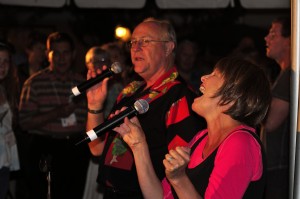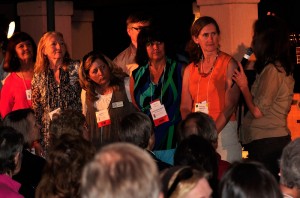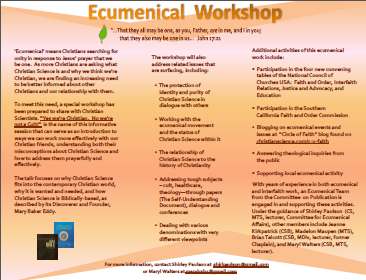Join the latest ecumenical workshop entitled “Yes, we’re Christian. No, we’re not a cult!” The workshop covers how Christian Science fits in a contemporary Christian world, why it is wanted and needed, and what individual Christian Scientists can do to support that. See flyer for contact information. The first such workshop in Northern California will be held on Saturday, July 12th at Arden Wood, San Francisco. The Ecumenical Workshop flyer has location details, information about sponsoring churches, and directions.
Engaging with the Faith Community
Summit Fruitage
by Sue Krevitt in Santa Cruz
Recently I was included in a Post-Summit meeting of sixteen Christian Scientists–wonderful folks eager to give-and-receive fresh and enlightening ideas on the topic of church–an important subject in all our hearts. There were Journal-listed practitioners, budding practitioners, a CS Teacher… all solid thinkers and doers in our movement, in this ‘place of thought’ called Northern California Church Alive!
With such pure motives, such love and desire to be all we can be in the world, expressing Mind/Life/Truth/Love, the results of this meeting (and other such gatherings going on around this globe) are, and have to be, nothing but GOOD!
I’m offering some thoughts on the topic “Let’s Share More NCCA Summit Fruitage!”
Question: Do I feel that the Northern California Church Alive Summit has brought me closer to my Goal: discovering more of my own (and others’) connection to God?
 Answer: Yes. My prayerful request had been: Put me in an atmosphere alive with conversation/discussion/idea-flow/ livelymusic/ singing/ sharing/ food/ fun/ art/even dancing! Help me find out what church can be…expanded waay out … to bring me to a larger place in thought to what church can be, perhaps is, in fact. My prayers were answered at the summit! It was all this and more.
Answer: Yes. My prayerful request had been: Put me in an atmosphere alive with conversation/discussion/idea-flow/ livelymusic/ singing/ sharing/ food/ fun/ art/even dancing! Help me find out what church can be…expanded waay out … to bring me to a larger place in thought to what church can be, perhaps is, in fact. My prayers were answered at the summit! It was all this and more.
Over this past year, my branch church has benefited by the light received at the Summit…the six of us who went are quietly–so far–sharing some of what we got, what changes/improvements/new ways we see might be well-received by our church family/community. These ideas are being prayerfully considered, some implemented (our business meetings are now in the SS, in a circle–more like a family circle than facing-backs-formal). We’ve used our main auditorium piano instead of the organ a few times. We are planning a Summit-Sharing Meeting soon, with light refreshments, videos, etc., and possibly asking some who attended the Summit to be presenters. One attendee told me she felt “transformed” by the Summit weekend!
Question: Why did I need 700 other people (Summit attendees) to help me feel more of my (and others’) connection to God?
Answer: For now, I want the connection and assurance from others that I am on the right track by staying on a spiritual path in this “very material world.”
Question: Why did I take part in the hundreds of emails and phone calls, etc., over 7 months to help host and staff the Summit last May?
 Answer: Although it was demanding, I have been rewarded with feeling good about using my God-given talents to help out in this way. I interfaced during the six months planning with 18 of the finest Christian thinkers and doers in our region, was inspired and uplifted by them, and more grateful than ever to be part of the CS movement! (And others worked much hard than I did, btw.)
Answer: Although it was demanding, I have been rewarded with feeling good about using my God-given talents to help out in this way. I interfaced during the six months planning with 18 of the finest Christian thinkers and doers in our region, was inspired and uplifted by them, and more grateful than ever to be part of the CS movement! (And others worked much hard than I did, btw.)
Question: What are some of my reasons to continue being involved with Post-Summit Discussion Groups?
Answer: Because I/we will continue to need each other for support, for networking, for inspiration and fresh ideas, for a while yet. The energy from the Summit is still strong, still vital! This work is the activity of divine Mind in our midst, the outpouring of Love in this “human realm.”
While God’s provision may not be the biblical loaves and fishes, clearly the sharing and love at the Summit and the Post-Summit meetings, on our website (www.csnorcal.org), in our emails and other conversations are all part of Love’s manna-of-today. Let’s feast!
I love learning that Truth is not abstract, impractical, ineffectual! It is solid substance, here-and-now stuff we can use today.
For instance? Go to www.csnorcal.org…
Here’s great info on how to join in the discussion ~ Re-visit the Summit videos ~ Contribute your ideas and ask your questions ~ Find out how others are renewing church services ~ be a more effective Sunday School teacher… and this site is growing, and will grow with your help!
A Church Liaison Group now forming is to keep our connection going…to bring and get information–like vital fertilizer!—to our church activity. The 77 CS churches and societies in the northern California region are rich resources for cross-pollination! (At the Summit, we used the analogy of gardening, seed-sowing, weeding, the Tree of Life, roots, etc. I think this is a great way to illustrate what we are doing, don’t you?)
I send you warm thoughts for ever-increasing joy and healing, as we go forward together on this great pathway of Life.
The High Goal
From the Circle of Faith blog:
by Brian Talcott, CSB
Have you wondered what is the true high goal of ecumenical dialogue? It is to heal the hatred, conflict and division within the Church Christ Jesus founded. Because healing is at the center of this global effort, certainly there is a place for Christian Scientists—since healing is one of the central expressions of our faith. Why get involved with Christians whose faith practices include other perspectives and priorities drawn from Christ Jesus’ life and teaching? Will dialogue with other Christians about our common beliefs weaken our healing practice in our own faith? Or are we being called to bring our healing practice to address some of the greater works Jesus promised and asked us to do.
There is a spiritual transformation going on globally….
Read the whole article here: https://community.christianscience.com/community/ecumenical_and_interfaith/blog/2014/01/18/144-ecumenical-dialogue-the-high-goal
Faith and Ecumenical Discussion Group Conference Calls
The Faith and Ecumenical Discussion Group holds an informative conference call on the first Sunday evening of the month at 7:30, hosted by co-coordinators Brian Talcott and Marilyn McPherson. We share our questions and experiences and learn of new activities happening in various ecumenical and interfaith groups in the area. An important development is the launching this year of an Ecumenical Workshop for Christian Scientists from the Manager of Committees on Publication.
The Ecumenical Workshop Flyer, defines ecumenical as:
“…Christians searching for unity in response to Jesus’ prayer that we be one.” (John 17:21)
We encourage readers to visit Circle of Faith regularly, where the latest post is headed “Have you wondered what is the true high goal of ecumenical dialogue? It is to heal the hatred, conflict and division within the Church Christ Jesus founded.”
The conference calls are open to all.
Next call: Sunday, Feb. 2, 7:30 p.m.
Dial-in Number: (661) 673-8600; Participant Access Code: 327950#.
What different ways might you find to work with your local interfaith group?
By Jan True
To me, interfaith participation has been such an important and fulfilling part of my work for church, originally as Assistant Committee on Publication.
I started in a small town in New Mexico where the members of the interfaith council were of mostly the Christian churches and the one Jewish community. They had breakfast meetings once a month and mostly shared what their different groups were doing in the community. At one breakfast meeting I gave a presentation on Christian Science to the group, got some wonderful questions, and even gave out several copies of Science and Health. At another time we had a prayer meeting for the entire town where I was able to share our correlative scripture of I John 3 with a large group of attendees.
In Nevada County, California, I was part of a new interfaith group. Most of the group were what I would call faith groups sort of on the fringes. It included Unity, Religious Science, Christian Science, United Methodist, Unitarian Universalist, and Episcopal faith traditions, but also included different groups such as a local hospice, the local hospital chaplain, and individuals with different spiritual practices. Each month we met at a different church or other location. And each time we met we heard the story of one of the attendees. When I shared my story it was all about my progress in Christian Science and my service to church. But I was most impressed in hearing the others’ very inspiring spiritual journeys. The purpose of this group was to learn about and support the diverse spiritual traditions in the community
Currently I attend the interfaith council meetings in South Orange County and participate in some of their activities. Each year we host two events, the main one being the spring Prayer Breakfast with about 200 attendees, including government officials, diverse church groups, and individuals. It always includes an inspirational guest speaker chosen by the council. Next year the Christian Science church will be doing a prayer message along with two other faith traditions at this breakfast. Last fall at a panel event our church sponsored Brian Talcott as a lecturer. For the last two years I’ve led a prayer team to support the Prayer Breakfast. This has been gratefully acknowledged as making a difference in the harmony of the event.
What different ways might you find to work with your local interfaith group?
Example of Interfaith Love
By Marilyn McPherson
I was struck by the final 3 paragraphs of the interview with outgoing First Reader of TMC Sandy Sandberg, from the October Journal, which to me exemplifies the way of harmony that is the natural outcome of learning more about and connecting with members of other Christian denominations and other faiths:
“When I was a Christian Science chaplain in the military, I worked with a Baptist chaplain—he was my supervisor—and we developed a very close relationship. He was so incredibly kind, gentle, and caring in his approach—so embracing of everyone and forgiving of shortcomings. I sensed he was genuinely living a “love your neighbor as yourself” example that I could only aspire to at that point in my experience. And I recognized that, and I loved him for what he was showing me from his own religious tradition.
“We would exchange so many ideas, and he’d ask me from time to time about Christian Science. I didn’t have to convert him. The important thing was seeing the power of good, the power of Truth, the power of Love at work in what we were both aspiring to do in helping others.
“The day I left the unit, and we were parting ways, we sat on a bench together outside. He turned to me and said, ‘Sandy, one day we’re all going to sit down on the banks of the river Jordan. And we’re going to laugh about these silly distinctions that we mortals make between the gospel message—that it means this or it means that—when we know what it really means. It means loving each other the way God loves us.'”
Isn’t that beautifully expressed?
True, I have encountered the writings and teachings of Christian mystics and luminaries from the Buddhist, Hindu, Jewish, Muslim and Native American traditions, but I don’t feel that I really know what I, as a CS branch church member, could or should be doing to connect with local faith communities. My thought is that I can at least share my thoughts, doubts, uncertainties and inspiration in this discussion group and learn what others of you are thinking and doing. Can I do more than post messages online and speak with other branch church members and visitors about interfaith and ecumenical ideas? How are any of you thinking about these questions? How are you praying about peace among adherents of different religions and spiritual traditions, including those who espouse no faith?
